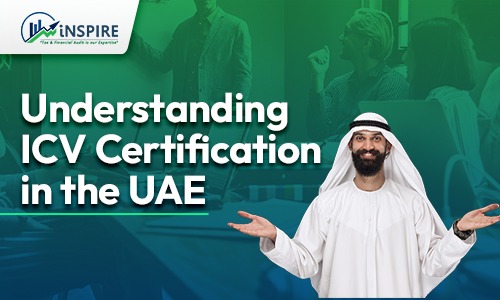
Understanding ICV Certification in the UAE
In a dynamic business environment like the United Arab Emirates (UAE), staying ahead of the curve is essential for sustainable growth. One key aspect that has gained prominence in recent years is the In-Country Value (ICV) Certification. This blog explores the significance of ICV Certification in the UAE and how businesses can leverage it to unlock new opportunities and foster economic development.
Introduction:
In a dynamic business environment like the United Arab Emirates (UAE), staying ahead of the curve is essential for sustainable growth. One key aspect that has gained prominence in recent years is the In-Country Value (ICV) Certification. This blog explores the significance of ICV Certification in the UAE and how businesses can leverage it to unlock new opportunities and foster economic development.
Understanding ICV Certification
What is ICV Certification?
ICV Certification is a strategic initiative by the UAE government aimed at promoting economic diversification and localization. It measures the contribution of businesses to the country's economy by assessing various factors, including local spend, Emiratization, and technology transfer.
Why is ICV Certification Important?
ICV Certification is more than just a regulatory requirement; it's a key to unlocking a myriad of benefits for businesses. From enhancing eligibility for government contracts to fostering a sense of corporate responsibility, ICV Certification is a powerful tool for businesses looking to thrive in the UAE market.
The ICV Certification Process
Step 1: Understanding the Criteria
Before embarking on the certification journey, businesses must understand the criteria set by the UAE government. This includes factors such as local procurement, in-country investment, and the employment of UAE nationals.
Step 2: Assessing Current Practices
Businesses should conduct a thorough internal assessment to gauge their current ICV standing. This involves evaluating procurement strategies, employment practices, and technology transfer initiatives.
Step 3: Implementing Changes
Based on the assessment, businesses may need to implement changes to align with ICV requirements. This could involve increasing local sourcing, investing in technology transfer programs, and actively participating in Emiratization initiatives.
The Benefits of ICV Certification
Access to Government Contracts
ICV Certification enhances a business's eligibility for government contracts, providing a lucrative avenue for growth and stability.
Competitive Advantage
Certified businesses gain a competitive edge in the market, signaling a commitment to the UAE's economic objectives and local community development.
Corporate Social Responsibility (CSR)
ICV Certification is not just about compliance; it reflects a commitment to corporate social responsibility. Businesses contribute to the economic and social fabric of the UAE by participating in this initiative.
Overcoming Challenges in ICV Certification
Navigating Complexities
The ICV Certification process can be complex, requiring a deep understanding of the criteria and regulations. Engaging with experienced consultants can help businesses navigate these complexities.
Cost Management
While the benefits are substantial, businesses must manage the costs associated with meeting ICV requirements. Strategic planning and effective cost management are crucial.
Conclusion
In conclusion, ICV Certification in the UAE is not just a regulatory hurdle but a strategic opportunity for businesses to align with the nation's economic goals. By understanding the criteria, navigating the certification process, and leveraging the associated benefits, businesses can position themselves for sustained success in the vibrant UAE market. Embracing ICV Certification is not just about compliance; it's about actively contributing to the growth and prosperity of the UAE.











